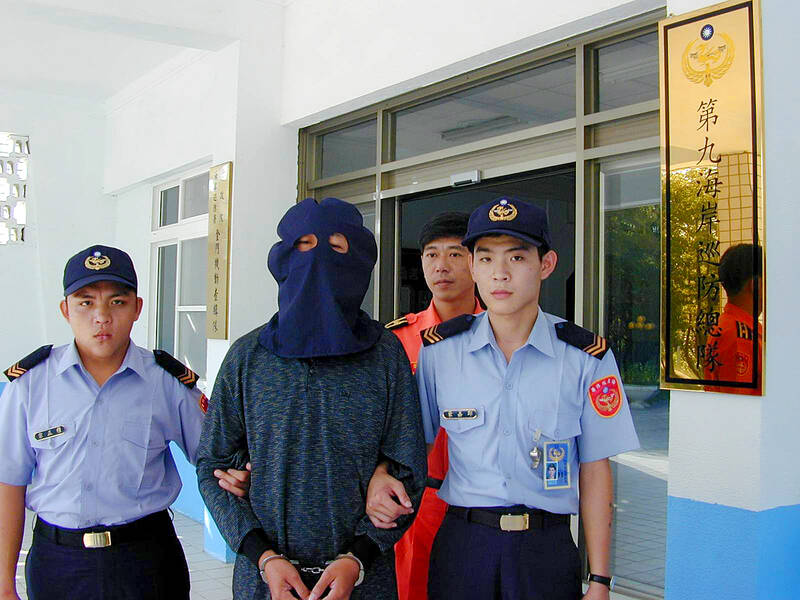A member of New York’s Chinese dissident community on Tuesday pleaded guilty to spying on his fellow activists on behalf of the Chinese government.
Tang Yuanjun (唐元雋), 68, had long been an outspoken critic of the Chinese Communist Party, joining monthly protests outside the country’s Manhattan consulate and founding a pro-democracy nonprofit in Flushing, Queens, where he has lived since 2002.
However, as he publicly advocated against his homeland’s government, Tang was quietly acting on orders from Beijing’s intelligence service to collect information on his fellow Chinese-American rights advocates, according to a guilty plea entered on Tuesday.

Photo: Taipei Times
Federal prosecutors, who brought charges against Tang in August last year, believe he accepted the tasks to gain approval to visit family members in China.
An e-mailed inquiry to his attorney was not returned.
“Tang’s betrayal of the ideals of the US to help the Chinese government repress pro-democracy activists goes against the very values he claimed to promote,” FBI Assistant Director in Charge Christopher G. Raia said in a statement.
At the direction of a Chinese intelligence officer, Tang agreed to photograph and record local protests against China, including a 2023 event in Manhattan dedicated to victims of the Tiananmen Square Massacre, court documents showed.
Tang also provided the officer with a list of immigration attorneys working to help dissidents gain political asylum.
Tang himself was granted asylum in the US in 2002, shortly after escaping to Taiwan from a Chinese prison, where he was held for 12 years for his involvement in student-led protests in Tiananmen Square, according to reports at the time.
Tang told authorities in Taiwan that he paid a fishing boat to bring him close to Kinmen County’s Tatan Islet (大膽島) before swimming to the islet on the morning of Oct. 15, 2002.
Tang surrendered to soldiers on Tatan and told them he wanted to defect.
The American Institute in Taiwan facilitated his move to the US, where he founded a Flushing-based pro-democracy group, the Chinese Democracy Party Eastern US Headquarters Inc, from he which he voiced frequent public criticism of the Chinese Communist Party.
In 2018, speaking with the New York Times about a book in which he was featured, Tang offered a hint of disillusionment about the role of a dissident abroad.
“In the first year you speak brave, bold words,” he said. “In the second, nonsense. By the third, you have nothing to say at all.”
Tang is to be sentenced in January next year. He faces up to five years in prison if convicted.
Additional reporting by staff writer

DAREDEVIL: Honnold said it had always been a dream of his to climb Taipei 101, while a Netflix producer said the skyscraper was ‘a real icon of this country’ US climber Alex Honnold yesterday took on Taiwan’s tallest building, becoming the first person to scale Taipei 101 without a rope, harness or safety net. Hundreds of spectators gathered at the base of the 101-story skyscraper to watch Honnold, 40, embark on his daredevil feat, which was also broadcast live on Netflix. Dressed in a red T-shirt and yellow custom-made climbing shoes, Honnold swiftly moved up the southeast face of the glass and steel building. At one point, he stepped onto a platform midway up to wave down at fans and onlookers who were taking photos. People watching from inside

A Vietnamese migrant worker yesterday won NT$12 million (US$379,627) on a Lunar New Year scratch card in Kaohsiung as part of Taiwan Lottery Co’s (台灣彩券) “NT$12 Million Grand Fortune” (1200萬大吉利) game. The man was the first top-prize winner of the new game launched on Jan. 6 to mark the Lunar New Year. Three Vietnamese migrant workers visited a Taiwan Lottery shop on Xinyue Street in Kaohsiung’s Gangshan District (崗山), a store representative said. The player bought multiple tickets and, after winning nothing, held the final lottery ticket in one hand and rubbed the store’s statue of the Maitreya Buddha’s belly with the other,

‘NATO-PLUS’: ‘Our strategic partners in the Indo-Pacific are facing increasing aggression by the Chinese Communist Party,’ US Representative Rob Wittman said The US House of Representatives on Monday released its version of the Consolidated Appropriations Act, which includes US$1.15 billion to support security cooperation with Taiwan. The omnibus act, covering US$1.2 trillion of spending, allocates US$1 billion for the Taiwan Security Cooperation Initiative, as well as US$150 million for the replacement of defense articles and reimbursement of defense services provided to Taiwan. The fund allocations were based on the US National Defense Authorization Act for fiscal 2026 that was passed by the US Congress last month and authorized up to US$1 billion to the US Defense Security Cooperation Agency in support of the

HIGH-TECH DEAL: Chipmakers that expand in the US would be able to import up to 2.5 times their new capacity with no extra tariffs during an approved construction period Taiwan aims to build a “democratic” high-tech supply chain with the US and form a strategic artificial intelligence (AI) partnership under the new tariffs deal it sealed with Washington last week, Taipei’s top negotiator in the talks said yesterday. US President Donald Trump has pushed Taiwan, a major producer of semiconductors which runs a large trade surplus with the US, to invest more in the US, specifically in chips that power AI. Under the terms of the long-negotiated deal, chipmakers such as Taiwan Semiconductor Manufacturing Co (TSMC, 台積電) that expand US production would incur a lower tariff on semiconductors or related manufacturing